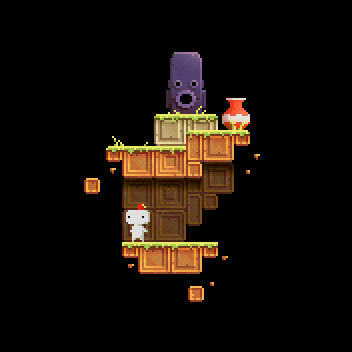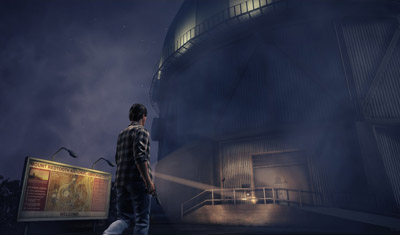Botanicula

Looking at Amanita Design’s earlier works, Botanicula is much more similar to Samorost than Machinarium. As such, it is a bit hard to know what to think of it. Gameplay-wise it is an exercise in pixelhunting to find illogical solutions to odd problems, but since the problems are so odd and the solutions so unexpected the game has an immense amount of charm.
And Amanita Design certainly knows how to make a charming game, Botanicula is their best work to date in this regard. Even if the gameplay had been awful, playing through the game would still be worth it to see the wordless story unfold. And it is hardly awful, just not interesting enough to be a challenge in its own.
Machinarium had a logically consistent world and while it still had some typical adventure-game-frustration moments, progression usually felt like solving puzzles rather than randomly clicking. It is nice to see that Amanita keeps evolving their storytelling but in terms of gameplay they have shown that they can do better.
Fez

Back when Fez was in early development, some people on the Tigsource forums mentioned that the idea was kind of similar to the PSP game Crush – Terry then mentioned that the ideas are fundamentally dissimilar. While there is a lot of overlap between the puzzles elements used in the two games, the limitations added by Fez feel like they made the concept tighter and more fun to play. More importantly, it helps that Fez manages to be a lot better at everything from macro design to aesthetics. For a good example of the difference good atmosphere makes, compare Fez and Crush.
On a grand scale, Fez feels like an exploration game where the actual exploration is almost only limited to what the player knows as opposed to any skills gained by playing the game. While this sort of reduces the replay value, it works remarkably well for a first playthrough and the game has a very fitting aesthetic and soundtrack that help drive home the feeling of exploring a world. In a way, it is not unlike Knytt.
Fez flirts a lot with older games – some of the art styles and elements are directly inspired by existing titles, game objects work similarly to how they do in other games and entire levels use mechanics that you rarely see modern games utilize. It is mostly a joy to behold the subtler things, but occasionally it becomes a bit much – occasionally you will come up to sections demanding reflexes and precision jumping, rather than changing the pace the game shifts completely from a puzzle game to an action platformer for no reason.
In addition to that, Fez is a really broad game – everything and anything can be a puzzle or a clue, oftentimes you need to take notes or solve puzzles outside of the game space in order to make sense of the information presented to you. While it helps a lot in making the world seem more alive, at times it felt like the proposed solutions mosty felt cumbersome and gimmicky.
Ultimately the tricky things are things I chose to do after the game had officially “ended”, though, and there is a good reason for that – Fez is a great game that you want to explore to its fullest. It is a bold game that manages to tie together a long legacy with out-of-the-box puzzles and still have its own identity – more than usual I feel that the things I do not agree with are because of my individual taste rather than the game having deficiencies.
Alan Wake’s American Nightmare

When we were developing Chronicles of Riddick: Assault on Dark Athena, the scope of the game was not clear until months before release. It started as the Special Edition of Escape from Butcher Bay with high-resolution art and a multiplayer mode, then we added another chapter with a few hours of single-player gameplay which got expanded to a really long new chapter and after a few more times of expanding the scope we had enough content to call it a sequel. Now, constantly adding more things is economically smarter than the common practice of being overambitious and having to cut content – we could have stopped working at any time and still had something we could release. The problem is that since we were adding things without having a good sense of the size of the game, cohesion suffered and since we could not explore it to the depth we should have it sometimes felt like shallow tasks that were repeated.
While Alan Wake’s American Nightmare is intended to be short; an episode of the Outer Limits when the original game was a season of Twin Peaks, I get the same shallow feeling from it. Alan Wake was a mystery that only revealed small parts over the course of the game, not knowing how it would end for the most of it made it interesting. American Nightmare, on the other hand, reveals itself as a freakish scenario from the beginning (not unlike the DLC for the first Alan Wake) and after playing less than half of the game the rest of it feels pretty obvious.
It also feels distinctively cheaper. The large vistas, vehicle sections and spooky environments of Alan Wake are gone, and the presentation details that were not quite there before, the animations and voice acting, are even worse now. Overall, the game feels constrained and doesn’t do a very good job of hiding it.
It is a lot better than the DLC though. Gameplay is more solid than the first game, and the story does have some interesting details that could have been expanded upon to make a better game. Remedy are doing something that is fairly unique so it might be the case that they just haven’t find the right way of doing it yet. It wouldn’t be the first time an episodic game series increases dramatically in quality after the first few episodes, so I am keeping my hopes up.
Mass Effect 3

The first time Mass Effect 3 annoyed me was when I learned about the galactic readiness – having to play multiplayer in order to see the best ending. As it turns out, you didn’t really have to do that. Also, the multiplayer was surprisingly good – not really varied enough to be fun all the way to advance two characters to level 20, but a solid shooter experience making good use of the customization and class gameplay. I had a lot higher expectations on the rest of the game which probably is why I chose to highlight the multiplayer as the good part.
First of all, the game feels rushed and is very buggy. I lost count on how many times it crashed, there were blatant animation issues in every other cutscene and entire multiplayer matches could be ruined by a single lag spike. Mass Effect 2 was nowhere near this bad so I wonder where it went wrong – beside the multiplayer there are very few notable new features.
In addition, the gameplay has taken a step down. Mass Effect 2 was far from the perfect shooter, but it had the basics right so I was kind of hoping that they would just keep the compelling core of class-based third-person cover shooting and fix the shooting bits… To be fair, the extended class system adds a lot of interesting variety while keeping the skill tree simple, but the cover shooting has taken a turn for the worse. Levels are littered with covers that will not actually protect you from incoming fire, or covers that will not allow you to fire back at the enemy. Some high-end enemies have attacks that instantly kill you, adding nothing but frustration to the fighting. Thankfully, the multiplayer levels are properly designed and enemies make more sense there.
The important part, of course, is the narrative. To me it wasn’t really about the ending, it was about the entire course of the game – the game is first and foremost about the conclusion of the galactic war. This is the core of what makes the approach taken in Mass Effect 3 bland to me – the game was never about the grand scenes and inevitable conclusion, but about the characters and your own choices. Mass Effect 3 offers a comparatively linear experience and attempts to replace the characterization found in Mass Effect 2 with visually impressive battles and pre-set moments of dramatic tension – the problem is it doesn’t really work.
Some of the events in the game felt really out of place in regards to how I had played, others (like enemies who were supposed to be frightening) just meshed really poorly with how the gameplay presented them. The thing that made the first Mass Effect games great were the choices, how the greatest narrative moments in the game were made much greater because the player could change the outcome. In Mass Effect 3, the Paragon/Renegade system is all but gone and the longer you make it the less the game cares about your choices. It’s not bad by normal videogame narrative standards – I thought Dragon Age: Origins had the same problem where the endgame ignored everything that had previously happened – but Bioware have shown that they can use different story structures that fit the medium better so it seems like they could have done more.
In the end, Mass Effect 3 is a good game that is in the unfortunate position of being the sequel to a great game.